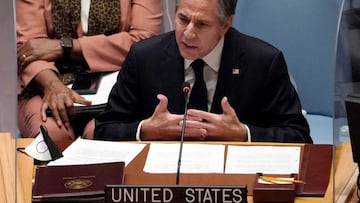Have US sanctions worked in the past?
Economic sanctions are one of the most common tools used in foreign policy. But under what conditions have US sanctions been the most successful?


Starting in 2014, after the Russian invasion and takeover of the Crimean peninsula, many countries including the United States imposed sanctions on the Russian government, officials, and business leaders. Russia responded by imposing their own sanctions, primarily in the form of complete bans on food exports on Australia, Canada, the United States, and the European Union.
Before the invasion of Crimea, the exchange rate between the US dollar and Russian ruble was $0.31 for each ruble.
After sanctions were applied by the US and its allies the exchange rate fell to $0.16. Currently, the rate stands at around $0.12 but could collapse completely if further sanctions are deployed.
This weekend, the White House and the European Union have announced further sanctions. Simultaneously, it is becoming clear that the previous attempts to debilitate Russia's economy and dissuade President Vladimir Putin have not worked, and many wonder if this round of sanctions will.
When are sanctions most likely to succeed?
The success of sanctions has been a topic studied widely within the field of international relations.
Political scientists, Thomas Biersteker and Peter A.G. van Bergeijk, described sanctions as a tool to "constrain a target in its ability to engage in proscribed activities."
The goal currently is to make the cost of continuing the invasion of Ukraine so high that President Putin would have no choice but to bring his troops home.
However, there is a second (and less studied) justification for sanctions which is based on deterrence. In some cases, sanctions can be applied to deter other actors from engaging in the same behavior. Some experts have stated that sanctions could be a way of deterring China from invading Taiwan. Should China believe that the sanctions it would face could not be weathered, it may factor into their calculus and dissuade them from taking that geopolitical move.
Keeping diplomatic channels open is critical for sanctions to be successful
Throughout recent history there have been many cases where sanctions have worked and failed. Through examining these cases, political scientists have been able to identify a few factors that help to explain why the impact has been so varied.
Biersteker and van Bergeijk wrote that "the effectiveness of sanctions depends on the alternative policy instruments available to policy practitioners," like "active negotiations, peace mediation efforts, threats of force, use of force, peacekeeping operations, and/or covert operations."
Without these other policy instruments the likelihood that sanctions achieve their defined goal are much lower. Very little information on the diplomatic channels open between the US, EU, Ukraine, and Russia have been made available to the public. President Volodymyr Zelenskyy has agreed to met with Russian officials, but has rejected the Belarusian capital, Minsk, as the negotiation site.
As for the threat of military action, NATO allies have made it clear that they will not get involved as such a situation could escalate to a third World War.
Timing maters when it comes to sanctions
In addition to keeping diplomatic channels open, social scientists have shown that if sanctions do lead to the desired outcome it typically happens rather quickly. The longer the sanctions are applied the less likely they are to succeed as the country's economy can adjust to the economic constraint and move forward.
Russia says that it sees Ukraine joining NATO as a red line, and it is becoming clear that the sanctions imposed in 2014 were not enough to change their mind on this demand.
Additionally, Russia has had to live with the sanctions, adapting their economy and alliances to ensure that they could decrease their dependency on the United States and Europe. In the years since the invasion of Crimea, Russia and China have built a much stronger economic alliance which could protect them from Western sanctions in the short-term.
Sanctions are typically more successful against less authoritarian regimes
When looking at instances where US sanctions have failed --Iran, North Korea, Cuba-- many are are authoritarian countries. When governments do not have to keep the interests of their voters in mind, they are more likely to reject international pressure from sanctions. Cuba has been under a crippling economic embargo for decades, showing that even the most severe sanctions often cannot shake the power of a regime.
In the case of Russia, Biersteker and van Bergeijk noted that sanctions generated "a rally around the flag’ effect;" meaning that rather than weakening the regime, it is actually strengthened it, as the sanctions were seen as an "external threat" by the Russian public.
US and EU announce more severe sanctions on Russian banks
Related stories
Many leaders in Europe and the United States are beginning to see that the sanctions deployed so far to do not seem to be having an impact on Putin's plans. This weekend, President of the European Commissions Ursula von der Leyen announced a sanctions package that excludes Russia from the SWIFT banking system noting that this will "ban the transactions of Russia's central bank and freeze all its assets, to prevent it from financing Putin's war." The Untied States announced that it is finalizing a similar sanctions package that would include the Central Bank of Russia.
Already many Russians are pulling their money out of banks over fears that international sanctions could lead to currency shortages.

